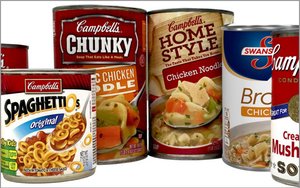 As part of its transformation in response to consumer preferences and health concerns, the Campbell Soup Company announced a specific date for fulfilling its 2012 promise to eliminate
Bisphenol A (BPA) linings from its cans.
As part of its transformation in response to consumer preferences and health concerns, the Campbell Soup Company announced a specific date for fulfilling its 2012 promise to eliminate
Bisphenol A (BPA) linings from its cans.
Campbell — which said it has tested “hundreds” of alternatives since it first announced its intention to eliminate
BPA linings in response to consumer feedback — now says it has begun that transition, and will complete it by mid-2017.
The company said it began transitioning to BPA-free,
acrylic- or polyester-based can linings this month, and will continue that transition across its U.S. and Canadian portfolio — including Campbell soups and gravies, Swanson broth
and SpaghettiOs pasta — through next year.
advertisement
advertisement
Campbell said it’s on track to have 75% of its soup portfolio in the new cans by December 2016.
Campbell is also testing alternatives to BPA coatings used on other packaging, including aluminum cans used for V8 beverages and metal screw-top lids on glass jars, and also
expects these packages to be BPA-free by mid 2017.
Finding new packaging solutions for the soups, gravies and pastas required identifying linings that would “ensure the safety
of more than 600 different recipes, such as tomato-based products, which are naturally acidic and can react with some linings over time,” the company explained. Campbell said that it’s now
confident that the acrylic and polyester options will ensure the first priority of food safety, and also preserve taste and affordability.
The company noted that it already offers
many products in non-BPA packaging like cartons, pouches and PET bottles.
Campbell is pushing hard to get out in front of the competition when it comes to addressing consumer demand
for simpler, “clean” ingredients and transparency.
Last July, Campbell announced its intention to eliminate artificial ingredients in its North American product
portfolio by 2018.
This year, in January, Campbell bucked much of the food industry by announcing that it now supports mandatory federal labeling of products containing GMOs,
and that it is beginning to label its own GMO-containing products in anticipation of Vermont’s GMO-labeling law, set to be effective July 1.
Since then, several other
major food companies, including General Mills, Kellogg, Mars and ConAgra, have reluctantly announced that they are also starting the GMO labeling process in the face of the Vermont deadline.
Last year, Campbell also introduced www.whatsinmyfood.com, a site that offers detailed
information about the processes behind its foods and packaging, including GMOs and BPA linings.
It’s also one of some 30 companies participating in the Grocery Manufacturers
Association’s new SmartLabel program, which employs QR
codes on packaging to take consumers to more product information online.
That program was at least in part originally developed as a hoped-for alternative to GMO and other expanded
ingredients labeling on product packaging.